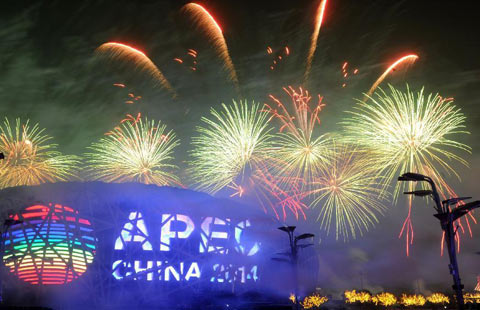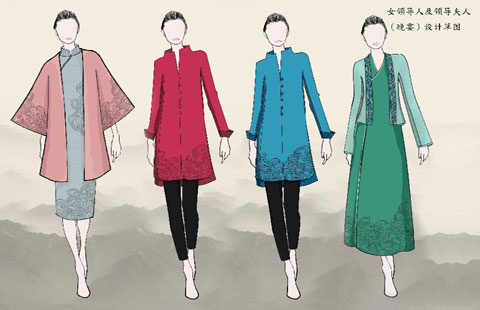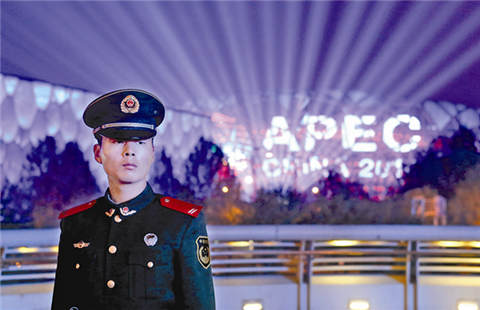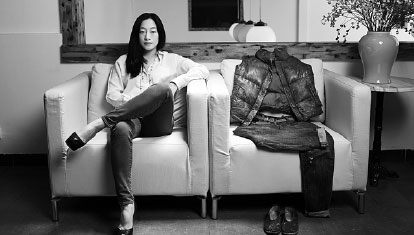Autobiography paints portrait of singer's switch to art
Updated: 2014-11-12 08:44
By Chen Nan(China Daily)
|
||||||||
Ai Jing's book Struggle, which hit bookshelves in Beijing on Nov 2, gives voice to her transformation from a pop singer-songwriter to a contemporary artist in 1998 after the release of her album, Made In China.
"I was devastated at the time because my album couldn't be shared with listeners," the 45-year-old recalls.
Authorities objected to the content.
"I didn't want to repeat my past as a songwriter. So I moved on with my new identity, which gave me a new life."
Ai started studying under acclaimed artist Zhang Xiaogang in 1999.
"I didn't write songs for a while. When I wrote the book, I realized music has been an indispensable part in my life and enabled me to become who I am today."
She invited two good friends and celebrated music critics, Jin Zhaojun and Zhang Youdai, as book launch guests.
The talk started with Ai's first song, My 1997. The semi-autobiographical ballad tells the coming-of-age story of Ai and her love for a Hong Kong man. She looks forward to Britain's 1997 handover to China so she can visit him.
The song made Ai, then 24 years old, a household name in China in 1992 and launched her career across Asia.
"It was a year when the song was played everywhere. Her fresh style contrasted with the heavy rock and love ballads in the market then," says Zhang Youdai, who's also a veteran DJ.
Zhang went to see her at an album signing held at Beijing's Xi'dan area in 1992.
"After talking with her, I found that we shared some mutual favorites among singer-songwriters," he recalls.
One of Ai's favorites is American songwriter and singer Suzanne Vega, who was listed in her new book among the 10 singer-songwriters who inspired her.
"One of her songs, Luka, overwhelmed me. For the first time, I realized singing could be as simple as telling stories. So I decided to write my own story," Ai recalls, referring to the creation of My 1997.
The native of Liaoning province's capital Shenyang was born into a musical family. Ai's father played several traditional Chinese instruments, and her mother was a Pingju Opera singer.
She received vocal training at age 9 and was expected to become a soprano. She became a pop singer against her parents' wishes.
Ai left home at 17 and joined the Oriental Song and Dance Troupe in Beijing, where she developed a passion for Western pop and rock.
Her second album, Story of Yanfen Street, and third album, Chasing the Moon, were released by Sony Music Entertainment Japan, which brought the singer-songwriter onto the international stage.
She worked with China-born Japanese conductor Seiji Ozawa in Japan in 1995. They became friends during the collaboration and, following Ozawa's suggestion, Ai moved to New York City in 1997.
She met Zhang Xiaogang in 1998 and started studying under him a year later.
His first lesson was to paint whatever she wanted, be it a coffee cup or a skull. Then Zhang Xiaogang told her to tell stories with her paintings. This suited Ai, since she'd been telling stories with her music.
Ai released her last album Dream Or Not, while practicing as an artist in 2003.
When she returned to China from New York to promote the album, she realized that the music scene had totally changed.
"Lip-synching, boring interviews and entertainment shows were very disappointing," Ai says.
She then decided to stop being a singer-songwriter.
Her biggest break as a contemporary artist came in November 2012, when she held an exhibition titled I Love Ai Jing at the National Museum of China, bringing such artworks as My Mom and My Hometown, a tapestry of woolen patches knit by Ai's mother and decorated with the English word "love".
"I was first impressed by Ai's lyrics, especially the song Wandering Swallow. Such poetic lyrics are rarely seen today, which is a pity," says Jin, who's also the Chinese Musicians Association's deputy secretary-general.
"We miss the music scene of the early 1990s because the songs were artworks. Today, most songs are just commercial products."
Jin says he and Ai have continued to occasionally meet since she became a full time artist.
"Good for her," Jin says.
"She has found a new outlet to express herself."
chennan@chinadaily.com.cn
|
Ai Jing, best known as a pop singer-songwriter who transformed herself into a painter, says moving on with a new identity gives her a new life. Provided to China Daily |
(China Daily 11/12/2014 page20)

 All cheers for wedding expos
All cheers for wedding expos
 Magnificent fireworks showed at APEC grand banquet
Magnificent fireworks showed at APEC grand banquet
 Chinese-style outfits designed for participants of APEC
Chinese-style outfits designed for participants of APEC
 Aviation airshow takes off in S China’s Guangdong
Aviation airshow takes off in S China’s Guangdong
 Consul-General Yuan says goodbye to San Francisco
Consul-General Yuan says goodbye to San Francisco
 Kissinger: 'Overcome' issues
Kissinger: 'Overcome' issues
 Peaking for APEC
Peaking for APEC
 Scenery near Yanqi Lake in Beijing
Scenery near Yanqi Lake in Beijing
Most Viewed
Editor's Picks

|

|

|

|

|

|
Today's Top News
Relaxed stroll sets mood for Xi, Obama
All cheers for wedding expos
Night view of Beijing's APEC Meeting site
In pics: Chinese-style outfits designed for participants of APEC
Aviation airshow takes off in S China’s Guangdong
Consul-General Yuan says goodbye to San Francisco
President hails regional trade move
Kissinger: 'Overcome' issues
US Weekly

|

|









